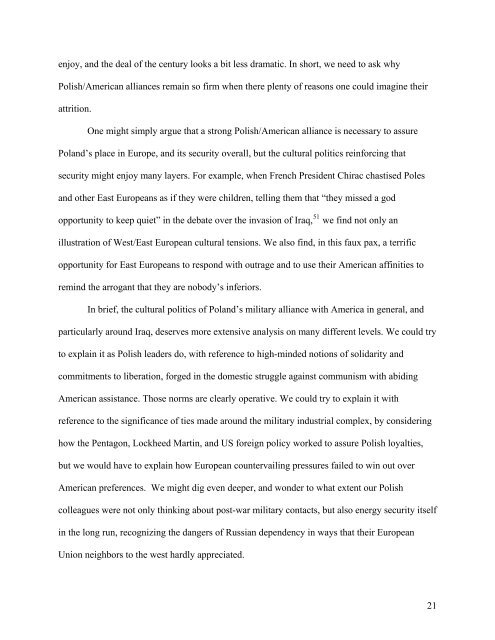from transition to hegemony - The Watson Institute for International ...
from transition to hegemony - The Watson Institute for International ...
from transition to hegemony - The Watson Institute for International ...
You also want an ePaper? Increase the reach of your titles
YUMPU automatically turns print PDFs into web optimized ePapers that Google loves.
enjoy, and the deal of the century looks a bit less dramatic. In short, we need <strong>to</strong> ask why<br />
Polish/American alliances remain so firm when there plenty of reasons one could imagine their<br />
attrition.<br />
One might simply argue that a strong Polish/American alliance is necessary <strong>to</strong> assure<br />
Poland’s place in Europe, and its security overall, but the cultural politics rein<strong>for</strong>cing that<br />
security might enjoy many layers. For example, when French President Chirac chastised Poles<br />
and other East Europeans as if they were children, telling them that “they missed a god<br />
opportunity <strong>to</strong> keep quiet” in the debate over the invasion of Iraq, 51 we find not only an<br />
illustration of West/East European cultural tensions. We also find, in this faux pax, a terrific<br />
opportunity <strong>for</strong> East Europeans <strong>to</strong> respond with outrage and <strong>to</strong> use their American affinities <strong>to</strong><br />
remind the arrogant that they are nobody’s inferiors.<br />
In brief, the cultural politics of Poland’s military alliance with America in general, and<br />
particularly around Iraq, deserves more extensive analysis on many different levels. We could try<br />
<strong>to</strong> explain it as Polish leaders do, with reference <strong>to</strong> high-minded notions of solidarity and<br />
commitments <strong>to</strong> liberation, <strong>for</strong>ged in the domestic struggle against communism with abiding<br />
American assistance. Those norms are clearly operative. We could try <strong>to</strong> explain it with<br />
reference <strong>to</strong> the significance of ties made around the military industrial complex, by considering<br />
how the Pentagon, Lockheed Martin, and US <strong>for</strong>eign policy worked <strong>to</strong> assure Polish loyalties,<br />
but we would have <strong>to</strong> explain how European countervailing pressures failed <strong>to</strong> win out over<br />
American preferences. We might dig even deeper, and wonder <strong>to</strong> what extent our Polish<br />
colleagues were not only thinking about post-war military contacts, but also energy security itself<br />
in the long run, recognizing the dangers of Russian dependency in ways that their European<br />
Union neighbors <strong>to</strong> the west hardly appreciated.<br />
21
















